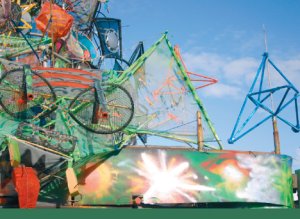
Marie Brennan calls for an end to the rigid distinction between professional and amateur artists.
A local authority arts officer once told me that the leisure and amateur sector were a pain, as they didnt understand the funding system, whilst another told me he could not justify supporting peoples hobbies. These comments signify a sad and broken link in the chain of arts provision. The amateur and leisure arts sector exist below the radar of Arts Councils and do not have access to professional funding, with the only source of support, either financially or artistically, being the local Council.
Of course, local authorities are able to support hobbies and sport provides an interesting example. Whether playing football in a park, badminton in a leisure centre, going to the swimming pool on the way home from work or performing at the Olympics, whatever your level, there is somewhere to go with support and recognition from local authorities and sports organisations. Participation is encouraged at all levels and is open to all. Would a local authority sports officer say he or she could not support hobbies? I doubt it, as the sports world does not have a problem with the amateur/professional split yet the arts world still makes this problematic distinction.
Art for arts sake
The leisure-based arts sector is usually artform driven by the desire of participants to practice and enjoy their chosen arts. Many leisure groups are not aspirational but are content to build a community around the processes of creative production. Typically, arts-based leisure groups pay little heed to wider policy agendas, as long as they are able to practice and serve their community of interest. In other words, they are focused around experimentation, survival and sustainability, rather than status and the search for prestige.
One of the key ways that people get together to take part in the arts is through education. The Workers Educational Association and other organisations have years of experience in running courses for people intended purely for fun and the quest for knowledge, enabling people to have a go, make new friends and maybe even exhibit or perform. Adult and community education though has suffered in recent years from the idea often a funding requirement that the provision of any arts course must be able to show progression. Participants must now be able to show they have developed a set of skills by the end of the course, and then progress onto the next level. This attitude is helpful for socially excluded groups who take up leisure courses to develop a body of evidence to bypass traditional obstacles to their chosen career, but for those who just want to create, use their imagination, and try their hand at something new, the idea of progression can actually be off-putting, and even socially irresponsible. Whole communities often develop around a specific course, and these communities are then broken up because their course did not show progression, and therefore had to be dropped. People who have had bad experiences of formal education, may not even enrol in the first place.
This attitude to informal education therefore needs to be more inclusive, and recognise that people join courses, workshops, seminars and other events for a range of reasons. For some it is to develop new skills in order to develop or change careers; for others it is purely to try their hand and find avenues for cultural expression that are neglected by the mainstream. For others, the reason may not be about the arts at all, but about an opportunity to alleviate social isolation, develop self esteem and find new friends.
Arts and the economy
Ireland, outside of Dublin, is still predominantly rural, with a lack of arts and leisure infrastructure. Those interested in the arts develop community festivals, neighbourhood arts groups and even the old back room of the pub music session themselves. These activities are self-funded, and managed often by a loose collective of interested people rather than a formal board and independence is prized. The pleasure, pride and enthusiasm in how the arts activity/event/happening is received demonstrates that leisure-based arts is a key player in keeping communities alive, and indeed there are economic social and artistic advancements. Tourism arising from rural leisure-based arts activity is hugely important to the economy and covers everything from large scale artists retreats and holidays, festivals and carnivals through to localised visits to community studios and exhibitions. The value of this voluntary activity includes social and artistic factors such as the ability to break down barriers to accessing the arts: it links people into communities and contributes to community capacity building. Leisure-based arts provide opportunities for inter-generational activities, for volunteering, youth projects and small-scale creative industries; they help people develop personal and social skills, offering empowering methods of social inclusion through alternative opportunities for marginalised people to take part. The leisure sector generates untold thousands of performances, exhibitions, workshops and events each year, delivering a wide variety of chances to participate and experience different artforms. People learn new skills, extend their knowledge and have many possibilities through which they can encounter the arts on their own terms including culturally specific festivals and carnivals, community micro-publishing, and digitally recording music to name just a few examples.
Expert advice
Popular culture would have us believe that we have a great need of professional expertise in all aspects of our lives. Television perpetuates the need for experts to tell us how to clean our houses, wear clothes, look after our children, tend our gardens or train our dogs. The arts are no different: we value the professional over the amateur the opinions of those with arts degrees, national tours, and well-publicised exhibitions on the CV are considered more valid than the opinions of the amateur. Yet thousands of people engage in creative practice for other reasons than prestige, economic advancement or intellectual kudos.
The creative economy is being touted as the new way forward, but maybe this viewpoint is killing the very industries it should be supporting. As artists come to view themselves collectively as a profession, creativity can suffer. Perhaps, then, it is to the leisure artist that we should look for ideas, authenticity, tradition, innovation and experimentation as this sector values the creative process as much as the creative product?
Creative ecology
To support leisure-based arts groups, perhaps we need to move on from economic agendas, and try to find other, more organic, holistic methods. Academics are already speaking of a creative ecology rather than a creative economy, and this model is perhaps more accommodating, as it includes all forms of creative production on the leisure/professional spectrum. This happens with great success in The Kilkenny Collective for Arts Talent in Callan, Co. Kilkenny (KCAT) which provides courses for everyone participants can take courses for pure enjoyment or enrol for assessed modules. Studio space is offered for professional and amateur artists to work side by side in an atmosphere of mutual collaboration.
A recent Irish Times article about the importance of song on Tory Island stated that it was common practice there for children to grow up and see people play instruments, or sing songs, despite a lack of professional performers. It isnt just on Tory island that people enjoy playing and listening, and that is the real reason people take part either as audience, consumer, participant or producer for fun, to enjoy the process of creativity. Maybe this shows we need to re-evaluate the image of the amateur and leisure artist. What we really need is a model of inclusiveness determining value in terms relating to creativity itself and not a second-rate aesthetic form that does not measure up to professional standards.

Marie Brennan runs Glasshouse, a Kilkenny-based consultancy firm working across Ireland and the UK in arts, cultural policy development, heritage, sport and leisure.
t: 00 353 59 977 5900; e: info@glasshouse.ie;
w: http://www.glasshouseireland@mac.com



